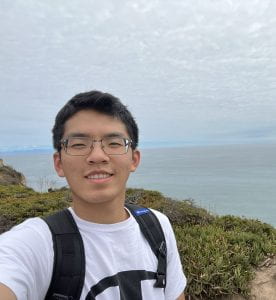John Chen

Please provide a brief summary of your research.
Broadly, my research focuses on testing the antimicrobial properties of different types of materials, both porous and non-porous, and evaluating their potential for usage in real-world environments, such as healthcare facilities and public transportation. Heavy metals such as copper and silver are known to have inherent antimicrobial properties, which has led to recent advancements in copper-coated and metal nanoparticle-containing materials. How environmental factors such as humidity could enhance or diminish the antimicrobial properties of these novel materials is poorly understood. My work aims to establish the antimicrobial efficacy of copper-coated stainless steel and metal nanoparticle-containing textiles under different humidity conditions, as well as determine how bacteria might respond to exposure to these materials. The testing process is actually quite simple: I apply bacteria to the materials in question and allow them to sit on the materials in a specific humidity environment for a given length of time. I then recover the bacteria from the materials and quantify the amount of surviving bacteria relative to the initial amount of bacteria applied. So far, I’ve found that the antimicrobial efficacies of both copper-coated stainless steel and metal-containing textiles are not significantly affected by changes in humidity. In the future, I will investigate using artificial saliva as the bacteria-containing medium, which contain salts and small molecules known to affect the viability of viruses. Ultimately, these test results will help improve our understanding of when and how to use heavy metal-containing materials in healthcare, commercial, and residential facilities for the benefit of public health, and reveal considerations we should make before replacing traditional materials with antimicrobial ones to prevent transmission of COVID-19 and other pathogens.
What made you initially interested in researching your project in particular?
Public health has always been a special topic of interest for me, and learning about superbugs and antibiotic resistance throughout high school got me really interested in the different “microbiomes” we interact with on a daily basis, whether it be in the air we breathe or in the lids of our water bottles. I wanted to get hands-on experience working with different microbes and become involved in something that could address the spread of antibiotic resistance. This project was the perfect opportunity to do so. The materials I was working with were potential alternatives to using antibiotics on traditional surfaces, and Professor Hartmann’s lab had a lot of really interesting bacterial strains gathered from indoor microbial communities.
What made you interested in pursuing (interdisciplinary) research more broadly?
For me, interdisciplinary research felt like the natural first step in putting the skills I’ve learned in classes to good use. Because research is so investigative, it has allowed me to take all the knowledge I’d stored in the back of my brain and use it to ask questions and learn even more skills. Unlike the many jobs and internships I was looking into at the time, research was much more amorphous in that I had the freedom to really think about what I wanted to explore and what skills I wanted to gain from my experience.
Describe your experiences with research thus far. Was it tricky? What skills do you think you’ve gained?
It was definitely intimidating going into lab the first day, but with a bit of time and a very supportive lab group, I felt comfortable with my project and the protocols associated with it. With wet-lab work, it took me a lot of time to wrap my head around each step of a protocol and understand why I was doing it. Because this was my first time working on a wet-lab project, I think one of the most important skills I learned was to be comfortable asking questions when I wasn’t sure about something. Knowing what you are doing and why you are doing it makes research much more enjoyable, and also allows you to learn a variety of different technical skills you might not have otherwise found.
Any tips or advice you have for students similar to you that are interested in pursuing undergraduate research?
When finding a research opportunity, make sure you find a project that you are genuinely curious about, not just because it sounds cool or “cutting-edge”. Your work might not seem as awesome as someone else’s, but you will be much more invested and be able to talk about your research more easily if it’s something you are genuinely interested in. Also, when research starts feeling slow because you aren’t getting good results or a piece of equipment is down and you can’t run a protocol, remind yourself that everyone in research has experienced something similar. Stay optimistic and focused on your project’s goals and remember that negative results can be useful as well!
Do you have a podcast/documentary/piece of shareable media related to your research? Post the link(s) to share here!
A fun video I watched when Professor Hartmann first introduced me to this project! I don’t actually use electroplating to make the copper-coated surfaces for my experiments, but it’s a really cool concept nonetheless! https://www.youtube.com/watch?v=T3qhqTVssoo
If you had unlimited time, money, resources, support, etc. what is something you would research?
I’ve always wondered what the optimal ratio of milk to cereal is.
Favorite bathroom on campus?
Shepard Hall basement
What is your most useless talent?
I can brush my teeth with either hand
